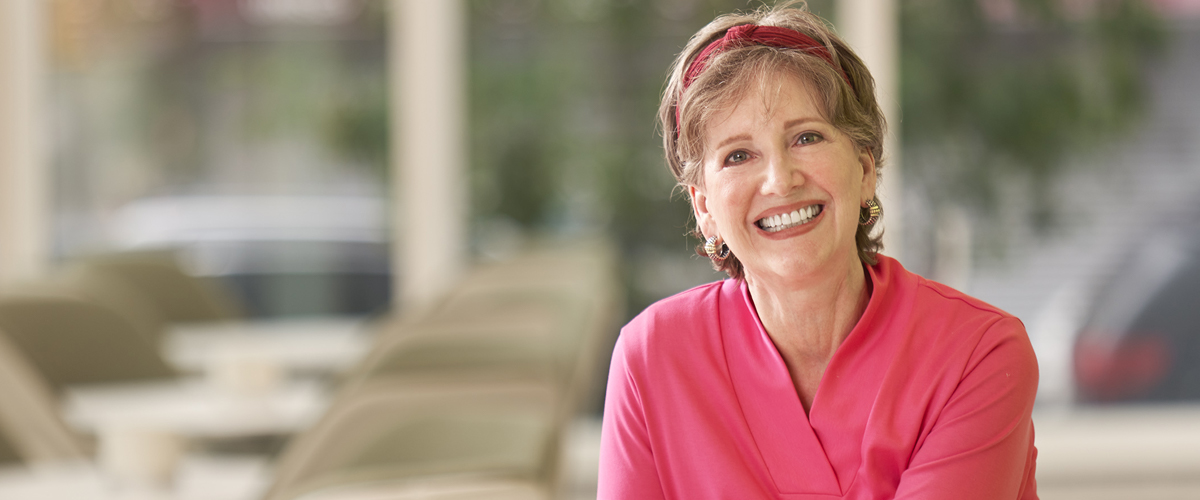What I’ve Learned From My Breast Cancer Journey
Lorraine Frazier, the dean of the Columbia School of Nursing, shares in her own words how her support systems and a positive outlook on life have helped her through her diagnosis.


I remember years ago, I was driving with my daughter, Molly, when a car on the highway flashed their lights at me. Just the day before, a family member had told me that flashing lights was a signal to watch out for something on the road ahead of you.
When we turned a corner, there was a big couch on the highway across the lanes. But since I had seen that flashing light, I knew to be careful. Someone was watching out for us.
My life has been about those little instances. I find that if you look around, there is usually the support that you need, just when you need it. After I got my breast cancer diagnosis, everywhere I turned I saw signs of love and support, big and small.
Last May, I felt a thickening in my breast and scheduled a mammogram. Just after my mammogram, the radiologist came out and let me know there was something abnormal on the reading. He did a sonogram and biopsy that day. It all happened fast.
For me, having breast cancer has been humbling. As the dean at the Columbia University School of Nursing, I am accustomed to giving support, with a mission to always keep patients front and center. When I went into this journey, I wished I didn’t need support, but I accepted it. And if you ask the faculty to describe me, they will tell you I often say, ‘I don’t like drama. No drama.’ So that’s how I approached my diagnosis and treatment.
I had a double mastectomy and underwent chemotherapy. The thing that helped me was I walked. I walked five miles a day through the whole therapy. There were some days where I was a little tired, but I held onto my husband, David, and we did our walking. I’ve lost 28 pounds, and my husband has lost 24. I hate to say there’s a silver lining, but when my husband went to his cardiologist he looked at him and said, ‘Wow, what did you do?’
“Here’s what I would tell patients: ‘This is you. You are unique. Find out what your strengths are. Use those strengths, whatever they are, and build on them. You can get through this.’”— Lorraine Frazier
I’ve had a lot of adversity in my life, starting from childhood. My dad was ill with kidney disease when I was 11. He died in his late 40s, and that was tough. We were immigrants in this country, and he was the main breadwinner. But we got through it. After David and I got married, we had Molly, who was born severely developmentally and intellectually disabled. She died last January at age 39. With Molly, the one thing we did with her is we loved her. We didn’t compare her. We loved who she was and we had a good little family and we were a threesome. She was ours and she was fine and she was perfect and she was beautiful to me.
So when I think about my breast cancer, I feel resilient because I know I’ve been through tough challenges. I have benefited so much and love the people who have been there for me. It is an amazing gift.
Here’s what I would tell patients: ‘This is you. You are unique. Find out what your strengths are. Use those strengths, whatever they are, and build on them. You can get through this.’
Also, if you’re going to listen to anybody, listen to your oncologist. They know your prognosis. They know your treatment. Work with the healthcare team so you don’t go in thinking, ‘What are they doing to me?’ You’re thinking, ‘This is what I want to do, and we’re going to do this together.’ My oncologist at NewYork-Presbyterian/Columbia University Irving Medical Center, Dr. Dawn Hershman, and the entire team, including surgeons Dr. Roshni Rao and Dr. Jeffrey Ascherman, radiation oncologist Dr. Eileen Connelly, and nurse practitioners Francine Armentano and Maura Abbott, have been wonderful.
A few years ago, I met a lady at a bus stop at Dunkin’ Donuts. We were both on our way to the Newport Jazz Festival. It turned out she was also from New York, so we stayed in touch and met up for lunch one day, but then the pandemic happened. I reached out to her recently and she told me she had moved to upstate New York. I told her about what happened to me, and she shared that she also had breast cancer. About three days later, she sent me a teapot and green tea and a little cup because that’s what helped her. Since then, I have sent the same gift to two other people who also had breast cancer. So I told my friend, ‘This is your legacy of caring.’
There are wonderful stories that happen through your journey that change your life and give you a foundation. I’m confident as I go forward that is going to continue. I’m optimistic, always.

